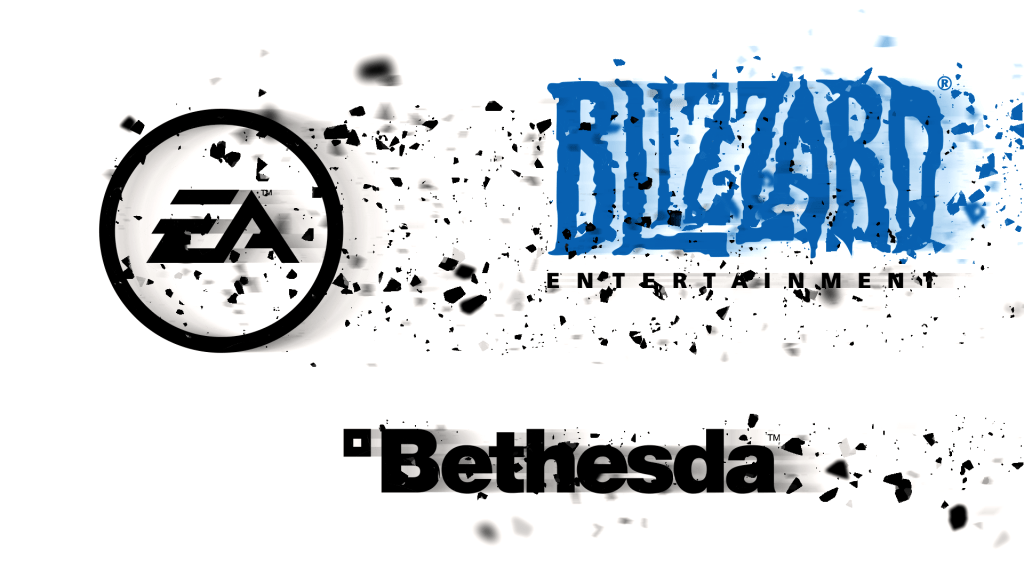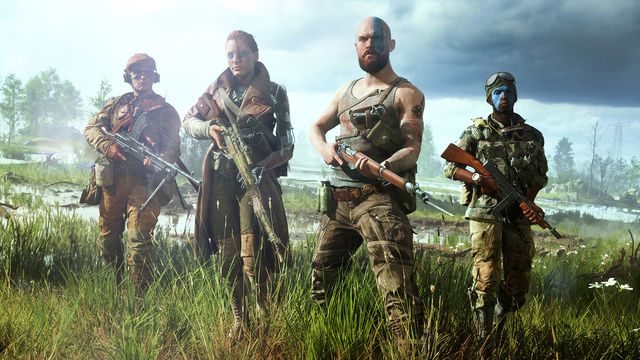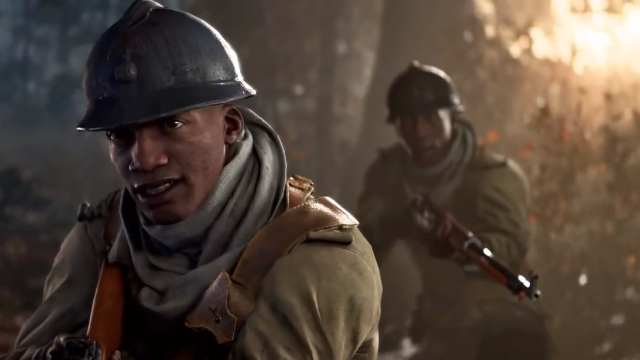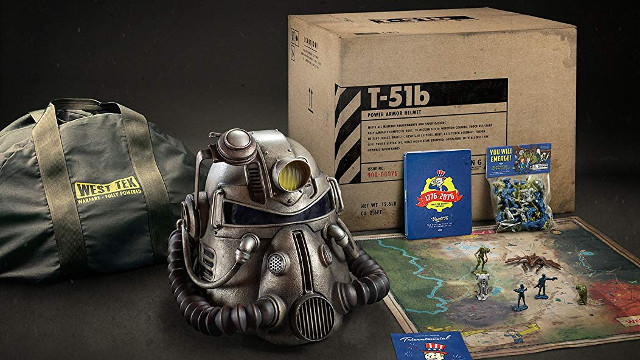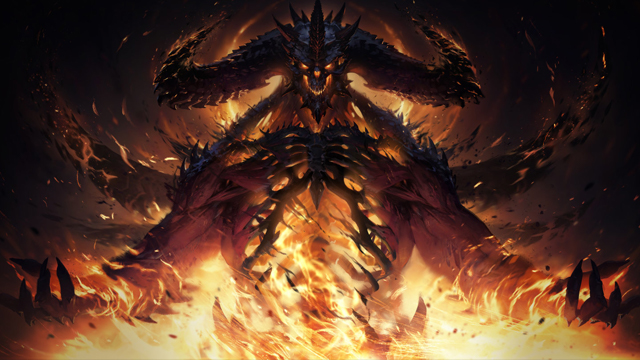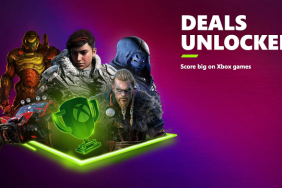Certain game companies have established themselves as monoliths of the industry. For years, no matter what lousy PR they’ve received, it never seemed to affect their numbers. As other studios have disbanded or been absorbed, these huge companies have continued to make more and more profits. However, in the last year, we’ve seen the public perception of conglomerates like EA, Bethesda, and Blizzard splinter to the point where even these giants are starting to reel.
In the last few months, in particular, we’ve seen PR blunders that would cause smaller companies to close occur with the Battlefield, Fallout, and Diablo franchises. The latest entries in each of these series have been subject to corporate decisions that seem out of touch at best and apathetic at worst. Unlike before, though, fans aren’t going silently. With the snowball effect of bad press over the years, have these companies reached their “too big to fail” moment, where they’ll be forced to change their approach to business?
EA: A Bridge Too Far
One of the worst mistakes Bethesda, EA, and Blizzard have made in recent years is a failure to identify what it is fans like in their games. Instead of dedicating the time to design a product that their player bases can be enthused about, it seems like these AAA companies have been riding on the coattails of games in the series that fans enjoyed. Until recently, it didn’t look like this was hurting sales too much. People would pre-order, hoping that maybe this time the studio would get the game right, and having spent $60+ players would inevitably try and find the silver lining and hope that the missing or popular features were patched later on.
EA is the exemplifier of this mantra. Even after the colossal disaster that was Star Wars Battlefront 2, which was basically the prototype for the “games-as-a-service” scheme that would go on to be included in Battlefield 5, EA and DICE failed to listen to fans. After an incredibly divisive teaser trailer premiered at E3 that looked like Fortnite: WW2 Edition, both fans with legitimate questions about the change in tone and historical accuracy from previous entries, and trolls who wanted to stir the pot flooded the internet with criticism about the game. Of course, the over-the-top antics of the more virulent critics and trolls who challenged the notion of women and minority fighters in the game outrang those who were more concerned about the over-the-top, strange portrayal of the Second World War, and anyone who criticized the game at all was lumped in with the extremists.
EA’s reaction, via then-Chief Creative Officer Patrick Soderlund, was maybe the strangest I’ve seen from a publicly-traded company. In June, Gamasutra asked him about “the women in Battlefield 5 backlash.” Soderland said, “You have two choices: either accept it or don’t buy the game. I’m fine with either/or.” This is definitely not the sort of thing to say if you want your audience to think you actually care what they have to say, even if you don’t agree with it, and this only strengthened the backlash against Battlefield 5. Soderlund ended up announcing his departure from EA in August, after a very short tenure as EA’s CCO.
The biggest slap in the face with Battlefield 5, ironically, is that the released product is nothing like what we saw in the E3 trailer. It’s a serviceable reskin of Battlefield 1 with World War 2 vehicles and weapons. The skins that are available all seem based on actual WW2 uniforms, and the multiplayer avatar system is similar to Call of Duty WW2 in that you can choose to be male or female and then select from premade avatars of various ethnicities. Out of the four single-player War Stories available, there’s one centered around a young Norwegian woman, and one that stars a Senegalese French Soldier and both are historically-based. So, really both (legitimate) sides of the argument won. In fact, had EA delivered marketing material that gave a realistic look at the game, there wouldn’t have been an argument besides a few trolls howling into the ether. The whole presentation of BF5, including tone, follows that first shown in Battlefield 1, which makes the controversy surrounding the game incredibly silly in hindsight.
With the release of Battlefield 5, we know the game was never meant to be representative of the E3 trailer, and that it was an utterly ridiculous portrayal of what the final product would be. Somehow, EA managed to insult everyone here. In the end, people excited for a game like that shown at E3 are in for a disappointment. Furthermore, since the material released is reasonably historically accurate, the whole controversy, and Soderlund’s comments, were completely unnecessary.
Enthusiasm for Battlefield 5 seems pretty low, and EA’s failure to listen to existing fans of the franchise in favor of nurturing controversy has backfired tremendously. With two games failing to meet expectations in a row EA DICE might see itself in dire straits with management, as EA is known to “reorganize” studios that don’t perform.
EA’s future doesn’t look the best, either. Its bank-rolling sports and mobile divisions will keep the publisher afloat, but its next big mainstream console game, Anthem, just hasn’t gotten the hype one would expect from a significant AAA online game. With two and a half months before launch, this could change, and the EA marketing machine hasn’t swung into full gear for it yet. However, if Anthem fails I wouldn’t be surprised if we see a restructuring of EA’s mainstream game development efforts.
Bethesda: Can’t Escape the Fallout
Until this year, Bethesda only could aspire to be as detached from its fanbase as EA. Unlike Electronic Arts, Bethesda manages to keep hold of a diehard group of fans that will defend the company to the death. Well, at least they did before Fallout 76.
Fallout 76 debuted at E3 to much fanfare, with promises from Bethesda littered around its announcement building it up as the Fallout fans never knew they wanted. It would be, as Bethesda never forgot to remind us at every opportunity, the first main series game that featured multiplayer as its driving feature, allowing players to experience the deep lore and signature series ambiance like never before. When it debuted, we quickly discovered Bethesda was indeed right on all counts. It was the Fallout no one wanted, and never before in the series has there been a worse way to present a story and a world.
When Bethesda invited GR to the Fallout 76 preview event, it seemed like a game that had potential. Outside of the confines of our guided tour, when I actually played the release version, this all fell apart. Not only did it contain a ton of bugs, but the multiplayer aspect completely breaks down pretty early on. There’s little reward for pairing up with someone, and the world seems more geared to solo exploration.
Besides the game being a mess, Bethesda’s handling of public reaction has been poor. The refunding process has been nightmarish for many players, and after a massive marketing hype for the game, many were underwhelmed.
https://twitter.com/mattecoconut/status/1069224944037519361
What made this situation worse is the lack of tangible evidence of a future direction for the game outside of some vague roadmap, meaning those stick with the game have no clue if it will become more entertaining down the line, and poor sales are calling the future of the game into question. Adding insult to injury is the fact that the $200 Fallout 76 Power Armor Edition has been reported as being subpar by owners, with a poorly-made helmet, and a bait-and-switch that saw people receiving a cheap nylon bag instead of the advertised canvas bag.
Bethesda’s initial response of “we’re not doing anything about it,” was only a bit worse than the official response of “shortage of material caused us to go with nylon instead of canvas.” Fortunately, for those affected, Bethesda gave a whole $5 (500 Atoms) in premium currency, which allows you to buy a door. And it’s not even that great of a door.
As you can imagine, such a small amount of pretend money was taken more as an insult than as recompense, and the Bethesda hate train is at full speed. In a turn of events, Bethesda has decided to do the right thing and distribute the canvas bags advertised with the Power Armor Edition to owners that send in proof of purchase, but this damage control may come too late to change public perception.
Fallout 76 is the straw that broke the camel’s back for a lot of fans after years of business practices. Things like re-releasing the same game over and over at full price, trying to make paid mods on Steam a thing and later releasing a paid mod store for Fallout 4 and Skyrim, and refusing to update or fix the Creation Engine in any meaningful way have led Bethesda from much-loved to maligned in the public eye.
With Starfield, Bethesda’s upcoming new IP, and Elder Scrolls 6 using the Creation Engine, there’s a chance these games will be perceived as lacking when compared to the offerings of other studios in the industry. Bethesda has been a victim of its own success, continually trying to capture the formula that made people buy Elder Scrolls and Fallout by the truckload. However, in attempting to do so, they’ve failed to innovate, leading to stagnation. Fallout 76 seems like an attempt to reverse that course, but with its failure to capture public interest, Bethesda has a hard road ahead if it still wants to be taken seriously as an industry leader.
Blizzard: How to Alienate a Fanbase
Both Bethesda and EA have caught plenty of flak in the past for anti-consumer decisions, but one studio that has come under fire recently has had a relatively clean history amongst its fans. Blizzard has faced a bit of criticism here and there, but its core fanbase have been zealots for the company for decades. Blizzard has inspired those who play its games to make them a part of their lifestyle like few others.
Tons of people have met in World of Warcraft and went on to get married or become best friends in real life. Overwatch has one of the most active fanbases I’ve ever seen, with tons of fanart and cosplay celebrating the game. Starcraft was the OG eSports game. These, and Blizzard’s other franchises, have tens of millions of fans worldwide, and for the most part, the company tends to be very receptive to its audience. At least, that’s how it was until recently.
Leading into this year’s BlizzCon, the annual celebration featuring announcements and events around Blizzard’s games, rumors were rampant about a big announcement for the Diablo franchise. Given that game was released in 2012, and the only full expansion for it, Reaper of Souls, came out in 2014, it seemed like the studio had to be primed for to announce Diablo 4.
Fans from around the world descended on the Anaheim Convention Center for BlizzCon 2018, and millions of gamers the world round watched the keynote announcements live. Unfortunately, many were disappointed. The best announcements centered around Blizzard’s older games. The fact that fans were most excited to hear about World of Warcraft Classic‘s release date and the announcement of a Warcraft 3 remaster should let the company know they’re headed down the wrong path.
MMO Fallout has been granted exclusive access to the latest Diablo Immortal build pic.twitter.com/CUazjBRMnn
— Connor (@mmofallout) November 22, 2018
Where Blizzard lost the crowd completely, though, was with its big Diablo announcement. Instead of revealing Diablo 4, the company announced Diablo Immortal, a mobile game that takes place between the second and third games. Ironically, Blizzard posted an April Fool’s joke in 2014 about a fake Overwatch-themed game called Happy Reaper, which poked fun at mobile games. Making this joke a reality 4 years later is not a good look for the company.
Blizzard fans responded with outrage, as could be expected. As large as the studio is, its release schedule is sluggish, and fans are often left wanting for new content for long periods. As an example, nine Call out Duty games came out in the time between the release of Diablo 2 and Diablo 3.
Many feel that Blizzard has sold out its old fans because of monetization. After all, the company has made a fortune in Overwatch loot boxes and Hearthstone card packs. Those who already felt that Blizzard was leaning too heavily on premium currency only had those feelings strengthened by the announcement of Diablo Immortal.
Since Diablo Immortal was revealed, Blizzard has stated that it’s working on mobile titles for multiple franchises. How severe this pivot to mobile will be isn’t known yet, but the company could find itself in a hard place easily. If it alienates its hardcore fanbase who play predominantly on PC and console in the hopes of quick riches on mobile Blizzard may find themselves burning a bridge it can’t afford to lose.
Moving the Bar
Creating and publishing games hasn’t ever been more accessible than it is right now. Games like Stardew Valley and Undertale, which would typically never be touched by AAA publishers like EA, can make millions by minimal advertising and word of mouth. In this climate, there’s definitely such thing as being too large to complete.
Big Western conglomerates like Blizzard, Bethesda, and EA face competition from smaller, more flexible studios that don’t have to aim for as high of a profit margin or astronomical sales. The surge of popular games from Japanese studios like Capcom, Atlus, Nintendo, and Sega also has increased competition tremendously for AAA franchises that used to be sure sellers.
Some larger studios have started to adapt. Ubisoft saw the writing on the wall and stopped Assassin’s Creed yearly releases to favor an emphasis on quality. The fact is that competition in the games industry is at its zenith, and gamers are jaded at the poor efforts from studios that are supposed to have a ridiculous amount of funds on hand.
Are EA, Bethesda, and Blizzard too big to fail? Not at all. I believe before that happens, though, they’ll see the writing on the wall. It’s much cheaper to make an effort to create the product your fans want than to throw money down the drain on productions that only earn you bad press. Reconnecting with fans is the only way for these companies to move forward, and hopefully, they’ll get this sooner rather than later.
